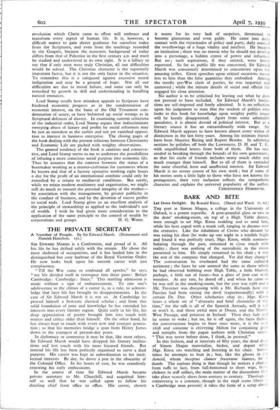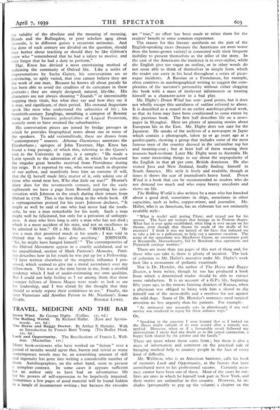BARK AND BITE
Let Dons Delight. By Ronald Knox. (Sheed and Ward. 7s. 6d.) THE port at Simon Magus, a college in the University of Oxford, is a potent soporific. A post-prandial glass or two in the dons' smoking-room, on top of a High Table dinner, were enough to set Mgr. Knox nodding and to send him, while his host coped with a trunk call, ranging in dreams over the centuries. Like the inhabitant of Crewe who dreamt he was eating his shoe (he woke up one night in a terrible fright and found it was perfectly true), Mgr. Knox, while somnam- bulating through the past, remained in close touch with reality ; there was nothing of the surrealistic in the vision presented to him. He simply remained in his chair ; it was the rest of the company that changed. Yet did they change?
The conversation he overheard had the same cultured acrimony ; the faces he saw seemed the same as those which he had observed bobbing over High Table, a little blurred, perhaps, a little out of focus—but a glass of port can work wonders. At any rate, he dozed off ; and when he came to he was still in the smoking-room, but the year was 1588 and a Mr. Taverner was discussing with a Mr. Richards how one Puccius had been raising the devil (experimentally) with a certain Dr. Dee. Other scholastics chip in ; Mgr. Knox hears a whole set of " abstracts and brief chronicles of the time," for the talk is all of the Spanish Armada, will it sail or won't it, and those awful men at Douai, and the North- West Passage, and potatoes in Ireland. Then they fade and he seems to wake ; but no, he is off again, the faces flicker, the conversazione begins to buzz once more, it is the year 1638 and someone is chivvying Milton for conjoining gods and nymphs from the pagan authors with Christian saints. " This was never before done, I think, in pastoral."
In this fashion, and at intervals of fifty years, the dead dons of Simon Magus materialise, bicker, and depart while Mgr. Knox sits watching and listening in his chair. Some- times he attempts to butt in ; but, like the ghosts in t:,e Aeneid, whom inceptus clamor frustratur hiantes, he dumb. The curious thing is that though he notices a cham: from ruffs to lace, from full-bottomed to short wigs, fro:- chokers to stiff collars, the main matter of the discussions thY take place scarcely alters from century to century. Theologi, controversy is a constant, though in the 1938 scene (there a Cambridge man present) it takes the form of a scrap about the validity of the absolute and the meaning of meaning. Bloods and the Bullingdon, or poor scholars agog about Aristotle, is in different guises a recurrent antinomy. And the dons of each century are divided on the question, should they bother about teaching or should they be like Gibbon's tutor who " remembered that he had a salary to receive, and only forgot that he had a duty to perform."
Mgr. Knox has devised a most entertaining method of indicating the continuity of Oxford life. Like a series of impersonations by Sacha Guitry, his conversations are so convincing, so aptly varied, that you cannot believe they are the work of one man. Because he knows all about parody he has been able to avoid the crudities of its caricature in these portraits ; they are simply designed, natural, life-like. His characters are not always shouting " Zounds " or interminably stapping their vitals, but what they say and how they say it is true, and significant, of their period. His orotund Augustans speak like men who understand the urbanities of life ; his twentieth-century Junglings, mouthing a compost of Bowery slang and the Teutonic polysyllables of Logical Positivism, scarcely seem to have attained the suburbanities.
His conversation pieces are joined by bridge passages in which he provides biographical notes about one or more of the speakers. To add verisimilitude, these are drawn from " contemporary " sources. Athenae Oxonienses annotates the Elizabethans ; apropos of John Taverner, Mgr. Knox has found a long passage, of which this, referring to the Queen's visit to the University in 1592, is a sample : " He made a Latin speech to the admiration of all, in which he rehearsed the singular great benefits received from Providence during her reign. It is reported by one, who wrote much in dispraise of our author, and manifestly bore him an extreme ill will, that the Q. herself made little matter of it, only asking one of those who stood near her, Who that little rat was?" Hearne's diary does for the seventeenth century, and for the early eighteenth we have a page from Boswell reporting his con- versation with Johnson in the coach during their return from Oxford in 1776. This is the best thing in the whole book. Of a septuagenarian praised for his years Johnson declares, " It might as well be said of one who had never had the tooth- ache, he was a man remarkable for his teeth. Such a man might well be felicitated, but only for a privation of unhappi- ness. A man who lives long is only a man who has not died ; which is a mere accident of his state, and not an excellence to be admired in him." Of a Mr. Shillett. " BOSWELL. ' He was a man that promised much in his youth ; I was told in Oxford that he might have done anything.' JOHNSON. ' Sir, he might have hanged himself.' " The contemporaries of the Oxford Movement appear in a cruelly acidulated, and so far unpublished, section of Mark Pattison's Memoirs. Patti- son describes how in his youth he was put up for a Fellowship. " I have written elsewhere of the magnetic influence I pos- sessed, which seemed to give me a moral ascendancy over my fellow-men. This was at the time latent in me, from a morbid tendency which I had of under-estimating my own qualities. But I could not help feeling as I sat among them that these younger fellows of Simon Magus were ready to look to me for leadership, and I was elated by the thought that they should so wisely repose their confidence in me." Finally, the later Victorians add Another Person to Mr. Nicolson's Some











































 Previous page
Previous page